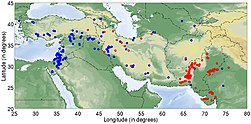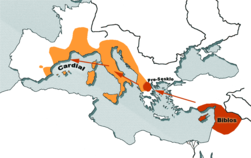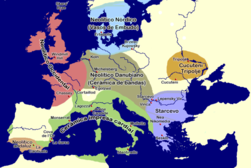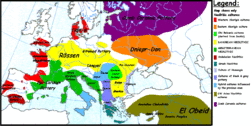The introductions of the country, dependency and region entries are in the native languages and in English. The other introductions are in English.
|

|
Atlas of prehistory
The Atlas of prehistory has to be filled with maps. More information: Update the atlas.
|

|
Homo sapiens spreading over the World
|

|
Map of Palaeolithic Art
|

|
Early Neolithic sites in the Near East and South Asia 10,000-3,800 BCE
|

|
Map of Cardium Pottery (Lower Neolithic, 6th and 5th milenium BC)
|

|
Map in Spanish language of generic Neolithic in Europe in the 5th millennium BCE
|

|
Map of the second half European Middle Neolithic at the apogee of Danubian and Mediterranean expansion (c. 4500-4000 BCE)
|

|
Map of the European Late Neolithic (c. 3500 BCE), showing the main cultures.
|

|
Occurrence of finds of the Bell Beaker Culture; 2600 BC BC to 2200 BC BC or until 1800 BC Chr. (Great Britain)
|

|
Map in Spanish language of the theoretical «historic line» in Europe between the 3rd millennium BCE and the 1st millennium BCE
|

|
The Iberian Peninsula (Spain and Portugal) in the bronze age
|

|
The world, 2000 BCE
|

|
The world, c. 1000 BCE
|
Notes and references
edit
General remarks:
- The WIKIMEDIA COMMONS Atlas of the World is an organized and commented collection of geographical, political and historical maps available at Wikimedia Commons. The main page is therefore the portal to maps and cartography on Wikimedia. That page contains links to entries by country, continent and by topic as well as general notes and references.
- Every entry has an introduction section in English. If other languages are native and/or official in an entity, introductions in other languages are added in separate sections. The text of the introduction(s) is based on the content of the Wikipedia encyclopedia. For sources of the introduction see therefore the Wikipedia entries linked to. The same goes for the texts in the history sections.
- Historical maps are included in the continent, country and dependency entries.
- The status of various entities is disputed. See the content for the entities concerned.
- The maps of former countries that are more or less continued by a present-day country or had a territory included in only one or two countries are included in the atlas of the present-day country. For example the Ottoman Empire can be found in the Atlas of Turkey.
|
Entries available in the atlas
edit
- General pages
- World
- Continents and oceans
- Themes
- Historical eras
- States with wide recognition
- States with limited recognition
- Dependencies and other overseas territories
- Country subdivisions
- Belgium
- China (mainland)
- India
- Pakistan
- Spain
- United Kingdom
- United States
- Russia
- Other
- Disputed subnational territories
- Other regions
- Cities
- Former sovereign states
- Former dependencies and overseas territories
- Former disputed territories
|














